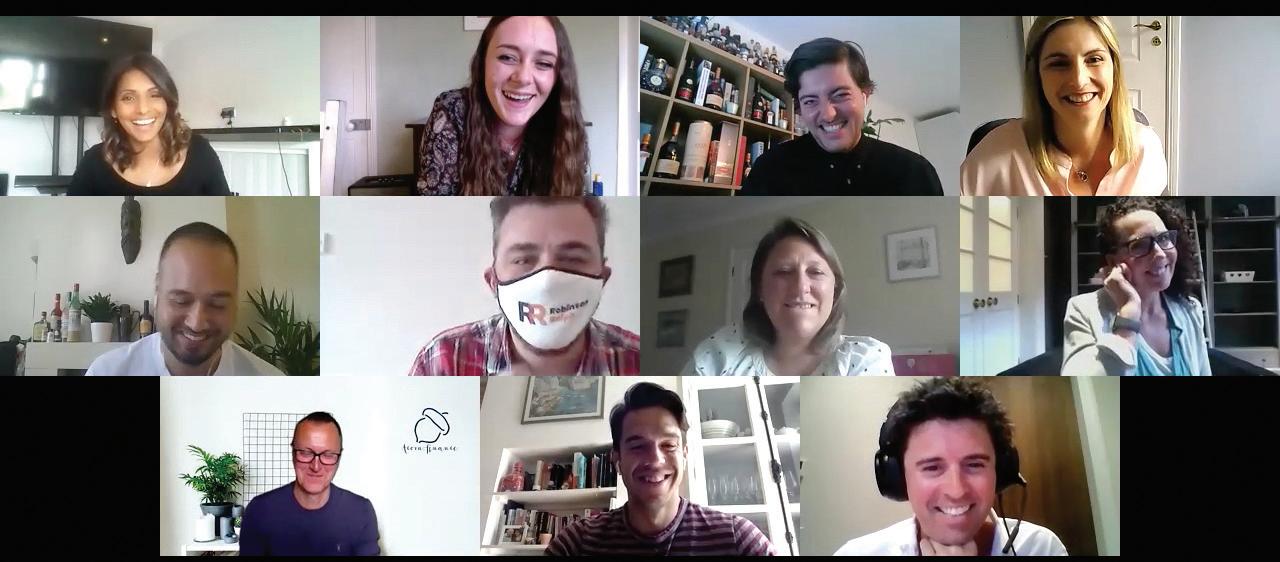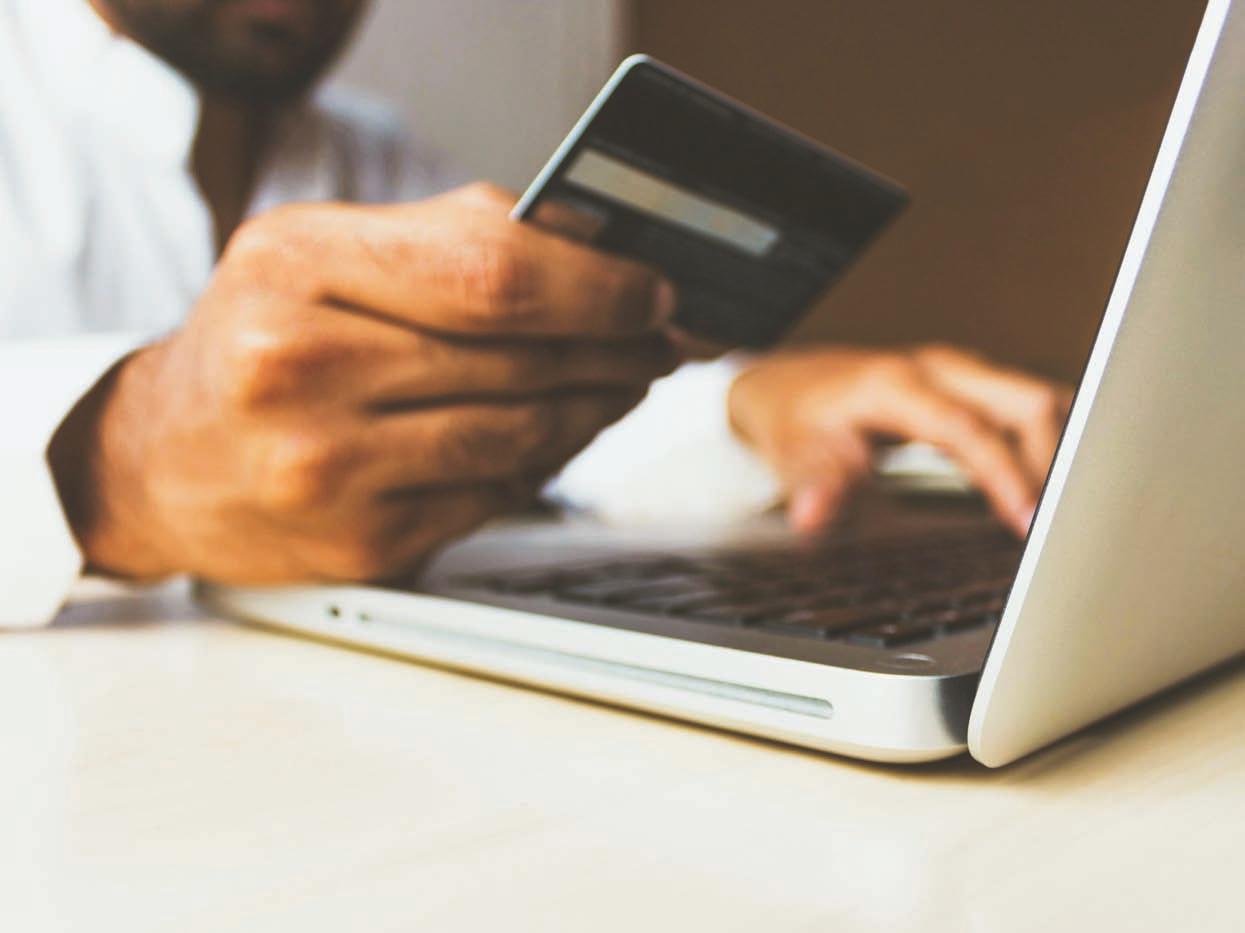
11 minute read
SQUARE SCREEN

Back to business
INDUSTRY EXPERTS IN FINANCE, LAW, TECHNOLOGY, DESIGN AND DRINKS COME TOGETHER WITH BAR TO DISCUSS THE HOSPITALITY LANDSCAPE AND GETTING BACK TO BUSINESS POST LOCKDOWN
On 1 July, just days before the offi cial reopening date for the UK hospitality sector, Bar’s second Square Screen – our take on a ‘round table’ event – took place via Zoom video call. A group of industry professionals, all with expertise in a particular fi eld, gathered in a relaxed virtual environment, sharing their views, experiences and advice on the subject of getting back to business.
Attendees included Lucy Marcuson from trade charity and community organisation The Drinks Trust, formerly The Benevolent, which has provided care and support to the drinks industry since 1886, alongside Raff aele Di Monaco, bars manager at the
20

prestigious The Berkeley Hotel in London. Authorities in technology, namely Katy Hamilton from The Access Group and Richard Carter, co-founder of OrderPay, a newly-launched mobile ordering solution, also joined the panel. Completing the lineup was Katie McCarthy, founder and design director of Design Equals, Simon Robinson, managing director of Robinson Ralph Solicitors, Paul Thompson of Acorn Finance, and drinks heavyweights Gareth Franklin, Luxardo brand ambassador, and Rémy Martin UK brand ambassador Jack Charlton.
The hour-and-a-half-long discussion centred around key areas, namely social distancing; encouraging trade through marketing, menus and technology; looking after customers and staff ; fi nance; and the future of the industry. The entire Square Screen video session is available to watch on the Bar website: www.barmagazine. co.uk/bar-square-screen-series.
WhAt kind of sociAl distAncing meAsures hAve been introduced? WhAt pressures hAve surfAced And hoW cAn We overcome them? Raff aele: “The change from two-metre to one-metre distancing has been great as we’ve been able to create more covers. We’ve had to make a number of changes, such as removing tables and creating a

one-way system throughout the hotel, but we’re quite lucky at The Berkeley, because we’re a big outlet, and therefore have a lot of space to work with.
“Regarding the operational side of things, we’ve generally worried more about back-of-house areas, compared to frontof-house, which, for us, was relatively easy to set up. We looked at how difficult it is to socially distance in a kitchen or bar-back space, recognising that we need to have the least amount of staff possible on shift, with each team member assigned to their own station.
“We’ve also had to get creative. We’ve set up a spacious pop-up restaurant on the side of the hotel, which will definitely help with revenue and also social distancing,

providing guests with a different option where they can feel confident and comfortable.”
Gareth: “Bars are going to have to be very strict in the way they communicate to customers. After a few beers, people are going to be merry and maybe want to move tables, for example, which will cause problems.
“There’s a real responsibility for bartenders. Obviously we’re not just talking about people getting drunk now – we’re talking about an infectious disease. A lot of customers might be really scared to be in close contact with others, so being strict is a problem we’re going to have to face.” As A result of sociAl distAncing, the design of venues is chAnging drAmAticAlly. WhAt support is out there? Katie: “From the very start, I’ve prioritised forming a support network of creative minds and experts to help prepare existing venues, looking at safety, space and style, and morphing these three priorities.
“For me, as a designer, it’s really important that the experience isn’t clinical and disjointed. Ensuring customers receive www.barmagazine.co.uk

a warm welcome is paramount. Recently, for example, we’ve been installing beautiful washbasins in entrances of bars, creating an almost temple-like experience for guests.
“We’re trying to constantly spin issues with a positive solution. Now, as a designer, it’s not just about finishes and clients asking how many people can they fit in their venue. Everything has to be considered – staff, the space itself, government advice, the products available and clients’ budgets. If operators are going to invest money, we want to ensure that it’s not wasted. Overall, it’s about investing in the future of the venue and making it better.” just hoW cruciAl Will technology be for venues? WhAt innovAtions Are out there? Richard: “We were originally going to launch our app OrderPay in September. Downloadable, it reskins to take on whatever brand or venue you’re in, using beacon technology, the same technology the government is using for track and trace. For instance, if you walk into a Nandos, it becomes Nandos, or if you walk in to a Slug & Lettuce, it then becomes Slug & Lettuce.
22
“After Easter, we quickly realised that we needed to operate. We’ve gone from a nice-to-have to being mission critical. When I spoke to a bunch of sector leaders, they said: ‘we know mobile ordering is the way forward because we want to limit interaction by not touching menus and payment terminals, but how do we get it to the table? We then decided to put in another piece of functionality – a bit of a buzzer, which lets customers know when their food and drink is ready at the bar to collect.”
“We’ve developed OrderPay as a cooperative coalition. We share 30% of our profits with all of the members and we don’t charge set-up or monthly fees. You can appreciate why we have 6,000 sites going live in the next three months.”
Katy: “Within the tech market, there has been a lot of innovation. At The Access Group, historically, we didn’t have a delivery and click & collect offering, but since we went into lockdown, within 48 hours, we were able to offer our customers the ability to deliver these services.
“We have carried that innovation on with our Access Collins booking technology product. Pre-booking and pre-ordering is key, presenting many upselling benefits. We’ve been developing the product so that we now have the ability to track and trace. If someone books a table on Access Collins, you can then, at the point of booking, put the whole group’s contact details in. We’ve been working on things like this over the last couple of months to really make life easier for reopening.”
“There are a lot of challenges coming up, but there are also opportunities for people to look at things in different ways. Some businesses moved into delivery and click & collect, initially in response to Covid, but now it’s part of their diversification and essential revenue.”
do you think We’re moving into A neW erA for hospitAlity? Are We in jeopArdy of losing the fAce-to-fAce interAction betWeen stAff And customers? Gareth: “In general, I think we’re approaching a new era. We’re consumed by technology, especially social media and our phones. The crisis has changed our social interactions massively.



“While apps have an important place, a lot of operators are still going to want to take orders at the table. Each establishment has its own personality, and they don’t want to let go of that – to let go of the social feeling.”
Richard: “I totally agree. Our solution offers pay-at-table only, as well. A fair few of our clients just wanted the pay-attable functionality prior to Covid, but are now choosing to have the order and pay functionality. Once a vaccine is found, they will most likely go back to only using payat-table. I think it’s about looking at how to build the experience and make it fit.”
GoinG back to the ‘new normal’ is GoinG to be stranGe and stressful for many hospitality workers. what kind of support is out here? Lucy: “At The Drinks Trust, we recognise that it has been, and will continue to be, a tough time. With the help of the drinks industry, we’ve raised a lot of money. Numerous large organisations have donated and other people are fundraising
24
as we speak. We’ve had more support than ever before, which is fantastic. That’s the reason we’ve been able to offer the services we have.
“We’ve supported nearly 2,000 people with individual financial grants. It was very obvious that people needed financial support quickly, but our goal was to support them in a more holistic way. The new idea behind The Drinks Trust is to offer something much bigger, building it into a community for the drinks industry and helping people on their career journey.
“We wanted push forward with our wellness services as quickly as possible. We offer various resources, such as blogs and talking therapies with Dr Julian. We’ve also partnered with Club Soda to bring free mindful drinking courses to the drinks industry, and Sleep Station, which is affiliated with the NHS and provides treatment for sleep insomnia, to help people manage their sleeping patterns. There are also many more plans for the future, particularly centred on ‘work life’.”
Simon: “As solicitors, we’ve been advising people throughout this whole crisis and giving them access to free resources. We’ve got flexible furlough template letters, CGRS Q&As, furlough redundancy Q&As, working from home policies, workplace social distancing policies, flexible working policies, guidance notes about returning to work. They are comprehensive and free, but it’s not legal advice. If you’re interested, please email info@robinsonralph.com. We’ll also offer 30 minutes of free advice on employment law to any business that contact us quoting this webinar.”
Katy: “Customers are going into a ‘new normal’, but so are staff. They might be facing reduced shifts, for example. As part of our solutions, we have staff scheduling tools and also offer on-demand pay, which gives staff access to their money straight after their shift. We launched it six months ago, and have found that people are using the money for emergencies such as paying bills. Staff might not have as many shifts, but they don’t need to be in financial hardship – they can have the money as and when they really need it.”
Jack: “At Remy, we’ve partnered with Flow hospitality to offer free online training courses to people affected by the pandemic. The courses are wide-ranging,

centred on bartending, food, health & safety, wine and more tangible sills such as management. For us, giving something back to the trade is really important.”
what are the main concerns and pressures regarding finance at the moment? what support is avaiLabLe? Paul: “In terms of general support, obviously there’s the business interruption loans, but the CBILS loan, especially, is taking months to come through. There’s a huge number of hurdles. These loans are not easy to apply for – they ask for quite a lot of information. Also, because the banks have also been hit with the same issues – people working from home, social distancing in offices etc – they’ve had all sorts of technological problems. It’s not business as usual for the banks.
“Hospitality businesses should be accessing the specialist funding available, whether it’s a bounce back loan for a smaller business or a CBILS loan. These are good schemes and we should be using them to help our businesses recover moving forward. The business that takes the loan has an advantage over the one that doesn’t. However, use it sensibly – to bolster your business, not to dig a deeper hole to fall into in a years’ time. Do the right thing for your business.” what creative ideas couLd operators tap into to encourage trade and stand out from competition? Gareth: “Sometimes I think we fail to see the full potential of what is already available to us. Something like Facebook, for instance, can be used in a variety of different ways. People come into your venue and have to check in. Because they’ve checked in, you’ve got a log of who was there, and customers have access to your page. From there, the possibilities are limitless. You can have your menu on the page, you can have stories – there are lots of different interactions. Let’s say you can’t offer music. On Facebook, you could have a DJ live streaming, and people can put an earphone in and listen. It’s about pivoting – seeing what you have and using it to your own benefit.”
Raffaele: “Prior to the pandemic, we were discussing a different way of presenting our menu. We strive to be a very eco-friendly hotel, and looking at the paper that was wasted throughout the year was mind-blowing. We came up with a QR code for every room and every table, which, once scanned, enables the menu to pop up on a smart phone or other smart device. We were already working on it before lockdown, but are starting to apply it now. Staff will be there to take the order and serve it to customers, but the need for the physical menu is removed.”
Looking forward, what shouLd we be ceLebrating within the hospitaLity industry? how can we bounce back? Jack: “The skillsets you have to learn working in hospitality are vast. You’re a councillor, a comedian, a psychologist – you have to master these different traits and be a social chameleon. People’s impressions are changing. If you look at bartenders or chefs – they’re now celebrities – superstars. They wear that badge with honour.
“There’s no other industry, that I know of, which has that same level of comradery as hospitality. People are really communityminded and community-spirited. For operators, staff are your biggest asset – you need to nurture them.”
DO YOU Want tO be invOlveD in OUr next event?
If you’re interested in taking part in a future Square Screen event, please email the team on bar@tgmpublishing.co.uk. The next virtual session will be taking place on Tuesday 1 September.

